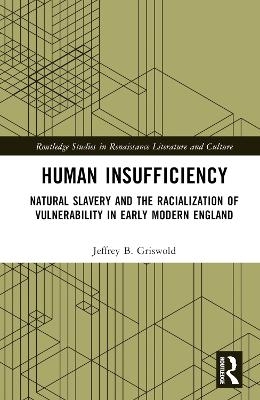
Human Insufficiency
Natural Slavery and the Racialization of Vulnerability in Early Modern England
Seiten
2023
Routledge (Verlag)
978-1-032-42269-5 (ISBN)
Routledge (Verlag)
978-1-032-42269-5 (ISBN)
By depicting the human political subject as exceptionally vulnerable, literary and philosophical writers portrayed the English as needing care from bodies imagined to be less than human in their physical sufficiency and therefore predisposed to servitude.
Human Insufficiency argues that early modern writers depict the human political subject as physically vulnerable in order to naturalize slavery. Representations of Man as a weak creature—“poor” and “bare” in King Lear’s words—strategically portrayed English bodies as needing care from people who were imagined to be less fragile. Drawing on Aristotle’s depictions of the natural master and the natural slave in the Politics, English writers distinguished the fully human political subject from the sub-human Slave who would care for his feeble body. This justification of a nascent slaving economy reinvents the violence of enslaving Afro-diasporic peoples as a natural system of care. Human Insufficiency’s most important contribution to early modern critical race studies is expanding the scope of the human as a racialized category by demonstrating how depictions of Man as a vulnerable species were part of a discourse racializing slavery.
Human Insufficiency argues that early modern writers depict the human political subject as physically vulnerable in order to naturalize slavery. Representations of Man as a weak creature—“poor” and “bare” in King Lear’s words—strategically portrayed English bodies as needing care from people who were imagined to be less fragile. Drawing on Aristotle’s depictions of the natural master and the natural slave in the Politics, English writers distinguished the fully human political subject from the sub-human Slave who would care for his feeble body. This justification of a nascent slaving economy reinvents the violence of enslaving Afro-diasporic peoples as a natural system of care. Human Insufficiency’s most important contribution to early modern critical race studies is expanding the scope of the human as a racialized category by demonstrating how depictions of Man as a vulnerable species were part of a discourse racializing slavery.
Jeffrey B. Griswold is a scholar of early modern literature and political philosophy. His work has been published in Exemplaria, Studies in Philology, Renaissance Drama, Spenser Studies, The Spenser Review, and Critical Survey.
Preface
Introduction
Frail Humanity in King Lear and Early Modern Aristotelian Political Thought
2. Human Vulnerability and Natural Slavery in The Faerie Queene
3. Servitude and Human Negative Exceptionalism in Montaigne, La Boétie, and The Duchess of Malfi
4. Unnatural Slavery and the Protection of White Women in Cavendish’s Assaulted and Pursued Chastity
5. Coda: Materializing Race and Salvaging Vulnerability in Jemisin’s Broken Earth Trilogy
Bibliography
Index
| Erscheinungsdatum | 02.11.2023 |
|---|---|
| Reihe/Serie | Routledge Studies in Renaissance Literature and Culture |
| Verlagsort | London |
| Sprache | englisch |
| Maße | 152 x 229 mm |
| Gewicht | 453 g |
| Themenwelt | Geschichte ► Teilgebiete der Geschichte ► Wirtschaftsgeschichte |
| Geisteswissenschaften ► Sprach- / Literaturwissenschaft ► Anglistik / Amerikanistik | |
| Geisteswissenschaften ► Sprach- / Literaturwissenschaft ► Literaturwissenschaft | |
| ISBN-10 | 1-032-42269-6 / 1032422696 |
| ISBN-13 | 978-1-032-42269-5 / 9781032422695 |
| Zustand | Neuware |
| Haben Sie eine Frage zum Produkt? |
Mehr entdecken
aus dem Bereich
aus dem Bereich


